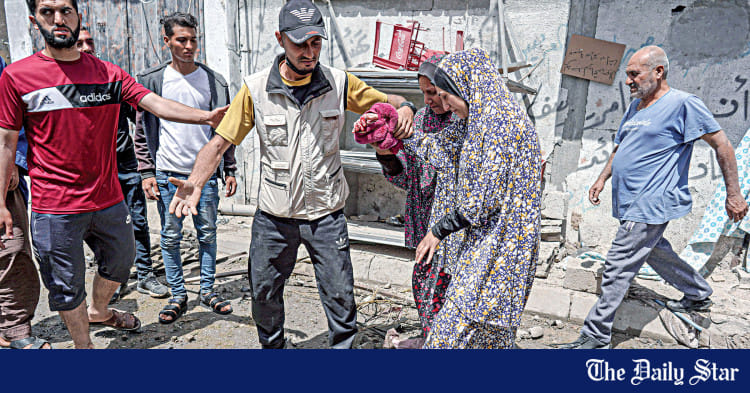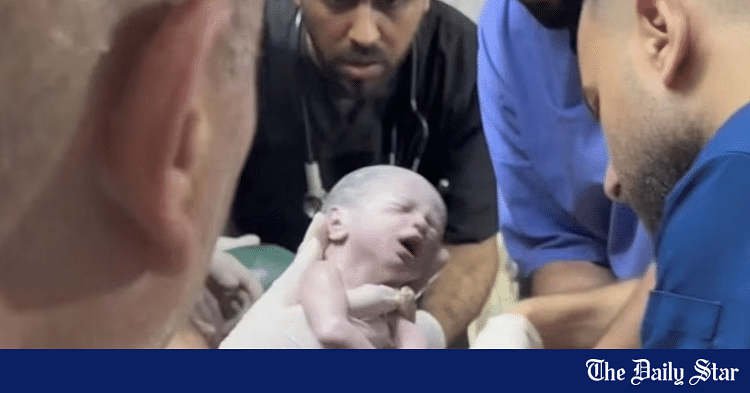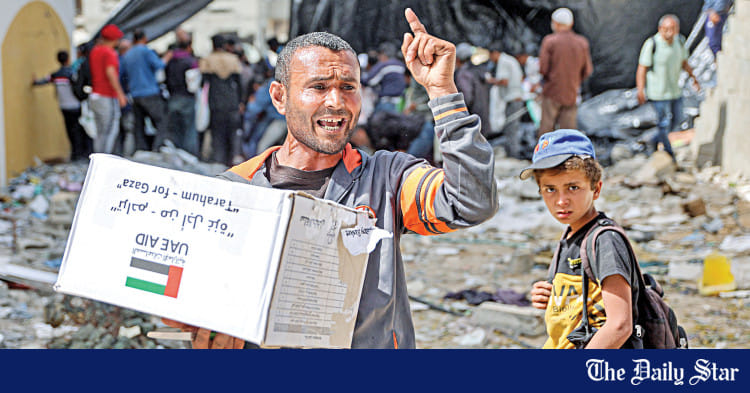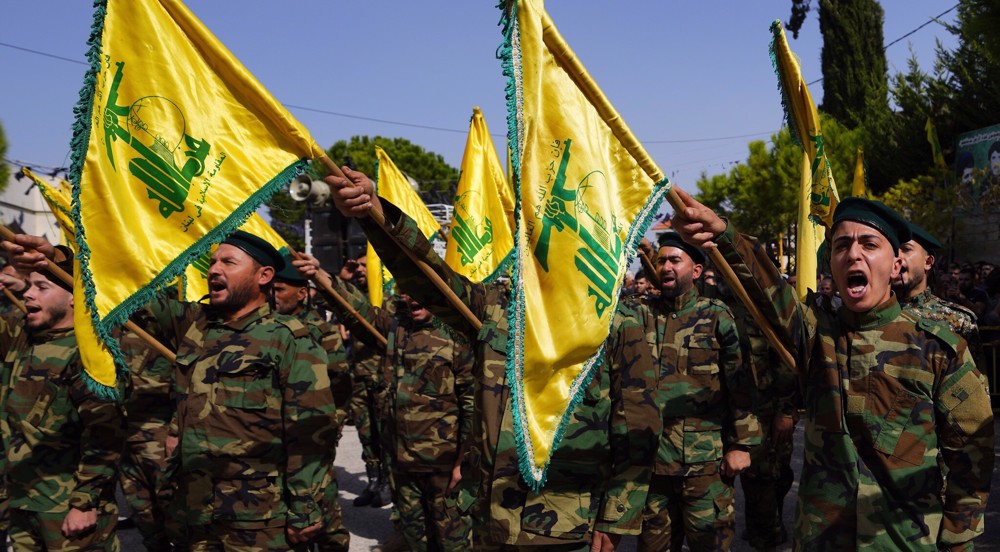Saif
Senior Member
- Messages
- 17,408
- Likes
- 8,373
- Nation

- Residence

- Axis Group

Israeli strikes on southern Gaza city of Rafah kill 22, mostly children
AP
Published :
Apr 21, 2024 20:07
Updated :
Apr 21, 2024 20:07

Palestinians look at damages following an Israeli raid at Nur Shams camp, in Tulkarm, in the Israeli-occupied West Bank on April 21, 2024 — Reuters photo
Israeli strikes on the southern Gaza city of Rafah overnight killed 22 people, including 18 children, health officials said Sunday, as the United States was on track to approve billions of dollars of additional military aid to its close ally.
Israel has carried out near-daily air raids on Rafah, where more than half of Gaza's population of 2.3 million has sought refuge from fighting elsewhere. It has also vowed to expand its ground offensive to the city on the border with Egypt despite international calls for restraint, including from the US.
The House of Representatives approved a $26 billion aid package on Saturday that includes around $9 billion in humanitarian assistance for Gaza.
The first strike killed a man, his wife and their 3-year-old child, according to the nearby Kuwaiti Hospital, which received the bodies. The woman was pregnant and the doctors managed to save the baby, the hospital said.
The second strike killed 17 children and two women, all from the same extended family, according to hospital records. First responders were still searching the rubble. An airstrike in Rafah the night before killed nine people, including six children.
Mohammed al-Beheiri said his daughter, Rasha, and her six children, ranging in age from 18 months to 16 years, were among those killed overnight and into Sunday. Her husband's second wife and their three children were still under the rubble, al-Beheiri said.
The Israel-Hamas war has killed over 34,000 Palestinians, according to local health officials, devastated Gaza's two largest cities and left a swath of destruction across the territory. Around 80% of the population have fled their homes to other parts of the besieged coastal enclave, which experts say is on the brink of famine.
The conflict, now in its seventh month, has sparked regional unrest pitting Israel and the U.S. against Iran and allied militant groups across the Middle East. Israel and Iran traded fire directly earlier this month, raising fears of all-out war between the longtime foes.
Tensions have also spiked in the Israeli-occupied West Bank. Israeli troops killed two Palestinians who the military says attacked a checkpoint with a knife and a gun near the southern West Bank town of Hebron early Sunday. The Palestinian Health Ministry said the two killed were 18 and 19 years old, from the same family. No Israeli forces were wounded, the army said.
The Palestinian Red Crescent rescue service meanwhile said it has recovered a total of 14 bodies from an Israeli raid in the Nur Shams urban refugee camp in the West Bank that began late Thursday. Those killed include three militants from the Islamic Jihad group and a 15-year-old boy. The military says it killed 10 militants in the camp and arrested eight suspects. Nine Israeli soldiers and officers were wounded.
In a separate incident in the West Bank, an Israeli man was wounded in an explosion Sunday, the Magen David Adom rescue service said. A video circulating online shows a man approaching a Palestinian flag that had been planted in a field. When he kicks it, it appears to trigger an explosive device.
At least 469 Palestinians have been killed by Israeli soldiers and settlers in the West Bank since the start of the war in Gaza, according to the Palestinian Health Ministry. Most have been killed during Israeli military arrest raids, which often trigger gunbattles, or in violent protests.
The war in Gaza was sparked by an unprecedented Oct. 7 raid into southern Israel in which Hamas and other militants killed around 1,200 people, mostly civilians, and abducted around 250 hostages. Israel says militants are still holding around 100 hostages and the remains of more than 30 others.
Thousands of Israelis have taken to the streets to call for new elections to replace Prime Minister Benjamin Netanyahu and a deal with Hamas to release the hostages. Netanyahu has vowed to continue the war until Hamas is destroyed and all the hostages are returned.
The war has killed at least 34,097 Palestinians and wounded another 76,980, according to the Gaza Health Ministry. The ministry does not differentiate between combatants and civilians in its count but says at least two-thirds have been children and women. It also says the real toll is likely higher as many bodies are stuck beneath the rubble left by airstrikes or are in areas that are unreachable for medics.
Israel blames Hamas for civilian casualties because the militants fight in dense, residential neighborhoods, but the military rarely comments on individual strikes, which often kill women and children. The military says it has killed over 13,000 Hamas fighters, without providing evidence.
AP
Published :
Apr 21, 2024 20:07
Updated :
Apr 21, 2024 20:07
Palestinians look at damages following an Israeli raid at Nur Shams camp, in Tulkarm, in the Israeli-occupied West Bank on April 21, 2024 — Reuters photo
Israeli strikes on the southern Gaza city of Rafah overnight killed 22 people, including 18 children, health officials said Sunday, as the United States was on track to approve billions of dollars of additional military aid to its close ally.
Israel has carried out near-daily air raids on Rafah, where more than half of Gaza's population of 2.3 million has sought refuge from fighting elsewhere. It has also vowed to expand its ground offensive to the city on the border with Egypt despite international calls for restraint, including from the US.
The House of Representatives approved a $26 billion aid package on Saturday that includes around $9 billion in humanitarian assistance for Gaza.
The first strike killed a man, his wife and their 3-year-old child, according to the nearby Kuwaiti Hospital, which received the bodies. The woman was pregnant and the doctors managed to save the baby, the hospital said.
The second strike killed 17 children and two women, all from the same extended family, according to hospital records. First responders were still searching the rubble. An airstrike in Rafah the night before killed nine people, including six children.
Mohammed al-Beheiri said his daughter, Rasha, and her six children, ranging in age from 18 months to 16 years, were among those killed overnight and into Sunday. Her husband's second wife and their three children were still under the rubble, al-Beheiri said.
The Israel-Hamas war has killed over 34,000 Palestinians, according to local health officials, devastated Gaza's two largest cities and left a swath of destruction across the territory. Around 80% of the population have fled their homes to other parts of the besieged coastal enclave, which experts say is on the brink of famine.
The conflict, now in its seventh month, has sparked regional unrest pitting Israel and the U.S. against Iran and allied militant groups across the Middle East. Israel and Iran traded fire directly earlier this month, raising fears of all-out war between the longtime foes.
Tensions have also spiked in the Israeli-occupied West Bank. Israeli troops killed two Palestinians who the military says attacked a checkpoint with a knife and a gun near the southern West Bank town of Hebron early Sunday. The Palestinian Health Ministry said the two killed were 18 and 19 years old, from the same family. No Israeli forces were wounded, the army said.
The Palestinian Red Crescent rescue service meanwhile said it has recovered a total of 14 bodies from an Israeli raid in the Nur Shams urban refugee camp in the West Bank that began late Thursday. Those killed include three militants from the Islamic Jihad group and a 15-year-old boy. The military says it killed 10 militants in the camp and arrested eight suspects. Nine Israeli soldiers and officers were wounded.
In a separate incident in the West Bank, an Israeli man was wounded in an explosion Sunday, the Magen David Adom rescue service said. A video circulating online shows a man approaching a Palestinian flag that had been planted in a field. When he kicks it, it appears to trigger an explosive device.
At least 469 Palestinians have been killed by Israeli soldiers and settlers in the West Bank since the start of the war in Gaza, according to the Palestinian Health Ministry. Most have been killed during Israeli military arrest raids, which often trigger gunbattles, or in violent protests.
The war in Gaza was sparked by an unprecedented Oct. 7 raid into southern Israel in which Hamas and other militants killed around 1,200 people, mostly civilians, and abducted around 250 hostages. Israel says militants are still holding around 100 hostages and the remains of more than 30 others.
Thousands of Israelis have taken to the streets to call for new elections to replace Prime Minister Benjamin Netanyahu and a deal with Hamas to release the hostages. Netanyahu has vowed to continue the war until Hamas is destroyed and all the hostages are returned.
The war has killed at least 34,097 Palestinians and wounded another 76,980, according to the Gaza Health Ministry. The ministry does not differentiate between combatants and civilians in its count but says at least two-thirds have been children and women. It also says the real toll is likely higher as many bodies are stuck beneath the rubble left by airstrikes or are in areas that are unreachable for medics.
Israel blames Hamas for civilian casualties because the militants fight in dense, residential neighborhoods, but the military rarely comments on individual strikes, which often kill women and children. The military says it has killed over 13,000 Hamas fighters, without providing evidence.











